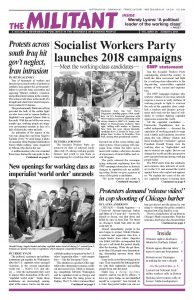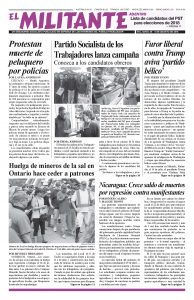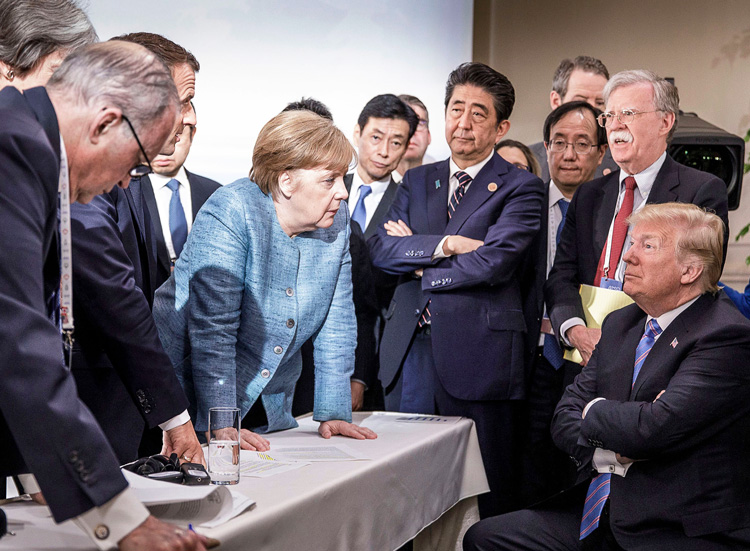The political, economic and military institutions put together by Washington after the U.S. capitalist rulers emerged victorious in the second imperialist world war — NATO, U.N. and others — were the instruments they used to impose their domination of the new “capitalist world order.” Today these institutions are increasingly coming apart at the seams. And so are the ones cobbled together in response by the U.S. rulers’ imperialist allies — and competitors — like the European Union.
This situation is a product of the capitalist rulers deepening economic, political and moral crisis, which is sharpening competition between Washington and its capitalist rivals in Europe and Russia and from the rising power in Beijing. The U.S. rulers worsened their position when they launched a series of wars in Iraq, Afghanistan and elsewhere based on the illusion that they had won the Cold War. Above all the conflicts among the rulers are a product of their failure to impose lasting defeats on the working class, which today is looking for ways to take on the debilitating attacks of the rulers, who seek to place the burden of their crisis on the backs of workers and farmers.
The scribes in the U.S. liberal media, and some Republicans, insist on saying the problem is President Donald Trump. But the cause of their crisis — and the biggest changes in their “world order” in 70 years — lies in their capitalist system.
Trump, seeking to advance the interests of the U.S. capitalist rulers, is helping advance these changes and — unintentionally, to be sure — doing so in a way that opens political space that is good for the working class. That can be true in the Mideast, Korea and elsewhere.
“I think Trump may be one of those figures in history who appears from time to time to mark the end of an era and to force it to give up its old pretenses,” veteran political operative Henry Kissinger told the Financial Times July 16, the day after Trump met with Russian President Vladimir Putin in Helsinki.
The US ‘world order’
NATO was formed in April 1949 to defend U.S. imperialist interests and as a bulwark against the spread of revolutionary struggles, especially in Europe. But in just a few months the U.S. rulers “lost” China, which they hoped to take over as a prize from their victory in World War II, when an uprising of millions ended the tyranny of the U.S.-backed landowners and warlords, unifying the nation and laying the basis to expropriate the capitalist class.
Then the U.S. rulers were defeated in their effort to impose their will in the 1950-53 Korean War and French imperialist forces were beaten in Vietnam. Washington founded the Southeast Asia Treaty Organization in 1954, a military pact that included the governments of Australia, France, New Zealand, Pakistan, the Philippines, Thailand and the U.K. It was unceremoniously dissolved in 1977, two years after the Vietnamese toilers kicked Washington out, reunified the country and opened the door to toppling capitalist rule there.
The Central Treaty Organization was established at the urging of London and Washington to bolster imperialist interests in the Mideast in 1955. It was composed of the governments of Turkey, Iran, Pakistan, the U.K. and from 1959 the United States. Following the 1979 Iranian Revolution — which overturned the tyrannical rule of the U.S.-backed shah and opened political space for millions of working people, women and the oppressed — CENTO too was dissolved by Washington.
Since the implosion of the Soviet Union in 1989 successive U.S. administrations have acted on the illusion that they won the Cold War. This has included incorporating 12 eastern and central European countries into NATO membership. Then the Washington-led organization in 2016 provocatively violated a NATO 1997 agreement with Russia, stationing 4,000 troops in permanent rotation near the Russian border, paving the way for new conflicts with its rising capitalist class.
The U.S. imperialists have waged a series of ongoing wars in the Mideast and Afghanistan that have undercut rather than restored stability for the capitalist rulers.
The current White House maintains and seeks to embellish Washington’s massive military might, but is seeking an alternative to acting as if it can use that power to impose its will through military conflicts. Instead, it seeks to negotiate ways out in Korea and the Mideast, looking for Moscow’s help.
The rulers of Germany, France and the U.K. refuse to pay their way in NATO, in the futile belief they can continue as world capitalist players and depend on Washington’s military power. And Washington is increasingly unwilling to pay for them. For the U.S. rulers the military “alliance” is subordinate to their direct relations with the rulers of other nations.
Washington’s EU foe splinters
When Trump accurately described the EU as a “trade foe,” the Financial Times and other liberal and globalist media slammed him. But Washington’s weaker competitors created the EU as a protectionist bloc to compete with the U.S. bosses, including the use of tariffs against them. And the German rulers use their domination of the bloc to squeeze working people in the weaker capitalist nations in southern Europe.
With no end in sight to capitalism’s social and economic crisis, working people there — as in the U.S. — have sought ways at the ballot box to express opposition to what they face and to those they hold responsible, most recently electing a coalition of anti-EU parties in Italy. President Trump’s liberal opponents have utilized these disputes and conflicts with NATO “allies” to paint him as a “traitor” and the destroyer of a “rules-based international order.” Writing in the New York Times Steven Erlanger and Jane Perlez say Washington’s “traditional allies” are “buttressing a global system that President Trump seems prepared to tear down.”
He does, believing direct talks between the U.S. rulers and other powers, whether in the declining capitalist nations in Europe or elsewhere, are far more effective today than being encased in blocs from the past.
As Socialist Workers Party National Secretary Jack Barnes describes in the article “Capitalism’s Long Hot Winter Has Begun” in New International no. 12, those who defend “transnational” institutions “ascribe powers to the capitalist world order that it does not have — embellish it with fetishes that make it appear more and more impregnable.”
“Every tendency toward the dissolution of state boundaries of the great imperialist powers in our epoch has been, and remains, an illusion,” he explains. “Each seeming success in stemming a crisis postpones and increases the magnitude next time around, sharpening the contradictions.”
The post-World War II “world order” is coming apart. Workers today are looking for ways to confront the effects of the capitalist rulers crisis. Through these battles they’ll find a road to tear that capitalist “world order” down once and for all.


